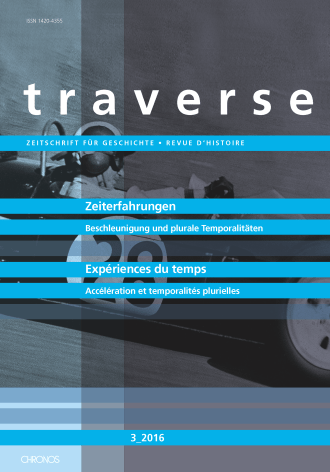The journal Traverse: Zeitschrift für Geschichte has just published a special issue on the topic of Temporal Experiences: Acceleration and Plural Temporalities (Zeiterfahrungen: Beschleunigung und plurale Temporalitäten). The table of contents may be found here.
In it, I have published a contribution on the concept of acceleration under the title:
Beschleunigung im langen 19. Jahrhundert: Einheit und Vielfalt einer Epochenkategorie
[Acceleration in the Long 19th Century: Unity and Plurality of a Temporal Category]

The essay starts by contrasting the influential theories of acceleration formulated by Reinhart Koselleck and Hartmut Rosa. On this basis, it argues for a new approach to the history of acceleration based in the methodical tradition of Historical Semantics.
From this point of view, the usual interpretation of acceleration as the distinguishing and dominant temporal mode of the modern era is left behind in favor of a more empirical approach. Taking German debates on the topic during the 19th century as a case study, the article shows how acceleration was not a singular phenomenon (defining the modern era) at all. Rather, it could have many different meanings according to the perspective and interests of various groups as well as the changing historical contexts. In this manner, the article argues for a differentiated focus on the ways in which ‘modern’ people interpreted their own temporality instead of the sweeping, but ultimately oversimplified identification of modernity as the ‘era of acceleration’.
